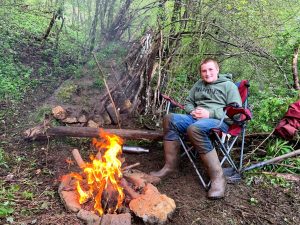
A Message to Our Graduates
 Well, I’m sure you’ve heard that we have had to cancel our Thrive! Homeschool Conference and graduation. So sad!
Well, I’m sure you’ve heard that we have had to cancel our Thrive! Homeschool Conference and graduation. So sad!
I was recently asked to share some words of encouragement to the graduates of the Forsyth Home Educators group by video since they were not able to have their graduation ceremony. They said they didn’t mind if I shared this message with the rest of our NC homeschool graduates. In this message I share six critical life principles that will help our graduates expend all their energy in the right direction. Enjoy!
Starting New Habits
 They say it only takes 30 days to form a new habit. That makes summer a great time to start! From putting our school supplies back in the cabinets to learning to wait for our turn, the four R’s are a great way to help kids develop new habits. The four R’s also work for parents, so why not work toward forming a new habit together?
They say it only takes 30 days to form a new habit. That makes summer a great time to start! From putting our school supplies back in the cabinets to learning to wait for our turn, the four R’s are a great way to help kids develop new habits. The four R’s also work for parents, so why not work toward forming a new habit together?
- Readiness is the first step. You will need to explain to your child what the new habit is and why they are doing it. For some habits, like switching over to cursive handwriting, you’ll also have to explain how. When they are able to recite it back to you, then they fully understand the concept and are ready to begin.
- Repeating is the next step. Just like riding a bicycle or playing the piano, the more we do something, the more naturally it comes—and the better we get! Be sure to praise your children as you remind them to practice their new habits. You will sound like a broken record, but remember: that’s okay if it’s playing your favorite song.
- Rewarding is the most fun step. Rewards come in all shapes and sizes, and there’s definitely a place for rewards in the classroom. When I was in school, I read tons of books every year just to get my own personal-size pizza. I did hundreds of math problems to help kids in a cancer hospital (and get a cool t-shirt with a calculator on the front.) In contrast to a bribe (which usually involves bargaining, nagging, or threatening) a reward is an immovable incentive to do something above and beyond what is already expected.
- Reminding is the final (and most crucial) step. Once your child has formed a new habit, it is so encouraging for them to receive reminders that they are doing a good job. Seeing their parents, mentors, and heroes grow in a new habit is just the type of positive reinforcement that will help your child want to pick up new habits again in the future.
NCHE members receive a FREE new habit chart download this month. Click here to become an NCHE member or renew your membership.
Are you starting any new habits this summer? Share your ideas with us in the comments below.
What NCHE Is Doing to Keep NC Homeschool Friendly

Spencer Mason (NCHE’s law and policy director)
Companion bills were introduced in the house and senate of the NC General Assembly last month that included laws related to homeschooling (HB 1047 and SB 706). The bills would have impacted homeschool families in two ways. 1) If you were a military family, you would have had to identify yourself as such annually. 2) All homeschools would also have had to complete some type of annual update as well. If these updates were not completed, then the school would eventually be closed. You can read more about the details and process these bills went through on this legislative update page.
The bill is titled “Education Changes for Military-Connected Students.” Even though not obviously relevant to homeschools, Spencer Mason (NCHE’s law and policy director) discovered its importance on the day that the senate bill was filed. Soon after, the NCHE legislative committee discussed the bill and agreed to oppose it. We were concerned that homeschools would be closed unintentionally by requiring annual updating and result in legal challenges. We also believed that the requirement for military homeschooling families to identify themselves was not beneficial to them and could threaten their security.
Spencer immediately began communicating with the sponsors of these bills to negotiate changes and new wording. When we informed homeschool families in NC, you went to work letting your representatives and senators know that you also did not want this bill.
When the meeting for the house committee took place, Spencer went to Raleigh to attend the meeting in order to represent NCHE and you as homeschool families. Dan Beasley from Homeschool Legal Defense Association also attended. Spencer and Dan spoke in the meeting to oppose the bill and the bill failed in committee.
We then turned our focus on the similar bill in the senate by meeting with senators on the committee and expressing our concerns. Based on these meetings, along with numerous emails and phone calls, the committee decided to amend the bill by removing all references to homeschools in the bill.
Thank you for your help in contacting your representatives and senators. If you want to help NCHE continue to work in these ways to keep homeschooling free and friendly in NC, please go here to give a donation.
All About My Dad
 Father’s Day is this Sunday! It’s time to celebrate Dad with all of his favorite things. Maybe you’ll share this over a picnic, or maybe you’ll share it at the taco shop he’s been missing since quarantine began.
Father’s Day is this Sunday! It’s time to celebrate Dad with all of his favorite things. Maybe you’ll share this over a picnic, or maybe you’ll share it at the taco shop he’s been missing since quarantine began.
Wherever your family settles in, this hilarious questionnaire is a fun way to laugh and enjoy all things dad!
- My dad is _____ years old.
- Dad is really good at …
- When Dad was my age, he wanted to be …
- Dad met mom at …
- Dad’s favorite dinner is …
- If Dad were an insect, he would be a(n) …
- Dad always says
- Dad’s favorite subject is __________________ but he doesn’t really like …
- My favorite memory with dad was when …
- Dad, what is your favorite memory with me?
A good father is one of the most unsung, unpraised, unnoticed,
and yet one of the most valuable assets in our society.
– Billy Graham
Raising Lifelong Learners
 All my children know I have one particular requirement before they can graduate from our homeschool. They must read and discuss with me How to Read a Book: The Classic Guide to Intelligent Reading by Mortimer J. Adler & Charles Van Doren.
All my children know I have one particular requirement before they can graduate from our homeschool. They must read and discuss with me How to Read a Book: The Classic Guide to Intelligent Reading by Mortimer J. Adler & Charles Van Doren.
Why is this book so important? Because one of the most critical skills I can impart to my children is the ability to learn. I don’t want to complete our home education only feeding my children fish. I want to teach them to fish. A person who has the skill of learning has the ability to find the information they need, to decide which books to read, to comprehend what is in those books, to critically evaluate their arguments, and to compare and synthesize this information with other sources. How to Read a Book teaches all of these skills! To learn more about why this book is important and what it teaches, you can listen to the workshop I gave at the 2016 Thrive! The NCHE Homeschool Conference, Raising Lifelong Learners.
You can stream the talk now, or download it for free here.
When You Stumble on the Path
 This weekend, I was walking on a path through the woods to our greenhouse. I walk this path at least once every day. The ground is slightly inclined, the foliage is natural, and on this particular morning, everything was pretty wet. As I walked, I was looking at the ground to make sure that I didn’t slip when I was clotheslined by a low hanging branch.
This weekend, I was walking on a path through the woods to our greenhouse. I walk this path at least once every day. The ground is slightly inclined, the foliage is natural, and on this particular morning, everything was pretty wet. As I walked, I was looking at the ground to make sure that I didn’t slip when I was clotheslined by a low hanging branch.
The next day, in an effort not to miss what could attack me from above, I stumbled over a vine that caught the toe of my sandal. I had to laugh because it seemed like the woods were suddenly personified into figures that were out to get me!
Later, as I sat pruning my vegetables, I thought about slipping on the path. I meditated on which things are most likely to trip me up:
- Things I don’t see
- Trying to avoid things that have tripped me up in the past
- Familiar things that I assume I know
- Abnormal conditions
- Lack of prudence or care
I thought on how this might apply to our family holistically—to our heath, our happiness, and our homeschool.
- Listening to others’ observations helps me see things I can’t see. My homeschool support group is a vital part of my homeschool journey because these parents are my friends, colleagues, and peers. We are on the same path—even if only a step or two removed from one another.
- Comparison is a thief of joy. I have to remind myself that every day is an opportunity to look forward.
- Assuming that I know everything is an issue of pride. As a teacher, I must remember to always be teachable!
- We can’t plan for every possible hiccup, but we can usually sense when things are a little off. It’s okay to take a teacher workday, gauge where we’re at, and set a new course.
- The Thrive! Conference is, without a doubt, consistently the place where I go to take care of myself as an educator. Every time I leave the conference, my confidence in my calling is renewed. The conference is when I am recharged. It’s where I am refreshed. It’s how I am encouraged that we can homeschool through the next phase.
I didn’t stop gardening because I tripped. I didn’t declare gardening was no longer a good fit for me. I laughed and realized that I am glad I wasn’t hurt, it’s probably going to happen again, and walking the path each day is worth it— because this is the path that leads to something really good! When we stumble, we stay the path because it leads to what we value.
What Does Racism Have to Do with Homeschooling?
 Racism is a fairly specific term that refers to those who believe that one race is superior to another. Many of us who do not believe that one race is superior to another may have struggled with prejudice at one time or another. By prejudice I mean that we do not treat those who are different from us with love and dignity. Whether we are talking about racism or prejudice, it is always wrong to mistreat others.
Racism is a fairly specific term that refers to those who believe that one race is superior to another. Many of us who do not believe that one race is superior to another may have struggled with prejudice at one time or another. By prejudice I mean that we do not treat those who are different from us with love and dignity. Whether we are talking about racism or prejudice, it is always wrong to mistreat others.
There are at least two ways that I believe racism is an important homeschooling topic. The first is that education plays an important role in eradicating racism and the second is that the homeschool movement is a community in which we do not want racism to exist.
Racism and Education
Quality education is a key aspect to change. As homeschool parents, we take the education of our children seriously. In addition, most of us understand our homeschool lifestyle to encompass much more than formal education. We desire also to teach our children principles of virtue, to develop character, and to raise people who love and serve others.
We can play a role in our homeschool families to continue to work to establish a nation in which all people are treated with love and respect. The most basic thing we can do is to teach our children the dignity of all human life created in the image of God. We can teach and show that the most basic way that we can love God is to love those around us. We can talk to them about the events that are taking place right now and help them understand humanity’s struggle with fear, selfishness, pride, and prejudice. We can also raise citizens who are well educated in history and politics. Understanding the historical context of racial relations and the principles and function of public policy will prepare our children to lead our nation.
The Homeschool Community
The homeschool movement is composed of regional and local communities. We are united by an educational strategy and lifestyle. As a unique community, we have the opportunity and responsibility to make sure that we are a group of people who treat those inside and outside our community with love and respect. We can work to make sure that we are a community that values racial, cultural, and religious diversity.
North Carolinians for Home Education exists to help parents homeschool with confidence and joy. As we work to accomplish this mission, we can take hold of this cultural moment to reflect on how we are preparing our children to live lives of love and how we can make sure that the homeschool movement grows into a community of love and acceptance of all.
What Can We Do?
- We can search our own hearts for prejudice and fear.
- We can educate ourselves on the experience and viewpoints of others.
- We can talk with our children about racism and prejudice.
- We can teach and exemplify to our children the importance of treating others with dignity and respect.
- We can take steps to broaden our relationships and communities to include those who are not like us.
– Matthew McDill, June 6, 2020
The Year We Started Homeschooling
 This week, as I was giving my son a haircut on our front porch, I had an epiphany.
This week, as I was giving my son a haircut on our front porch, I had an epiphany.
While I was trimming, we were talking about when his dad and I were his age. That’s when it occurred to me: both my husband and my sister homeschooled for just one year. Of course I knew these facts separately, but I had never made that connection in my mind. The idea that homeschooling for a single year had been so beneficial to their educational and emotional development really resonated with me.
They came from different socio-economic classes. They were different genders. While my husband had attended private Christian schools before homeschooling, my sister had attended public schools. My husband was a struggling reader, but my sister was academically gifted. Yet they both needed a break. And for both of them, the year that they homeschooled was necessary to recalibrate. It was a time to recover from a hard year. It was a time to draw closer to their friends and family. It was when they became more independent and confident. To this day, my parents, my in-laws, my husband, and my sister look back on “that crazy year we homeschooled” with amazing memories and tons of laughter!
So my question for you is this: what is stopping you from giving homeschooling a chance for just one year?
This time next year, you may find that homeschool is the perfect educational option for your family long-term, or you may find that it was the perfect fit for your family for a season. Either way, homeschool immersion may be just what your family needs to move from floundering to flourishing. So what if 2020 wasn’t just “that crazy year that we didn’t have any toilet paper?” What if 2020 is “that crazy year that our family took a leap of faith and started our wonderful homeschool journey?”
What do you think? Could taking this approach be just what you needed to give homeschooling a chance? Share your thoughts in the comments below.
When Should I Let My Children Make Their Own Decisions?
 My 13 year old son said he wanted to go live in the woods for 24 hours. He built a fort he plans to sleep in. The temperature is 43 degrees and it is pouring down rain. You can imagine mom had a few questions and concerns about this adventure. I did too. But I also understand it. We told him that in a few days it would be sunny and warm. Why not do it then? But he had his heart set on it and he wanted the “extreme experience.” He packed his books in ziplock bags, made some sandwiches, got his sleeping bag and went on his way. His self enforced rule is that he can’t come back to the house for 24 hours.
My 13 year old son said he wanted to go live in the woods for 24 hours. He built a fort he plans to sleep in. The temperature is 43 degrees and it is pouring down rain. You can imagine mom had a few questions and concerns about this adventure. I did too. But I also understand it. We told him that in a few days it would be sunny and warm. Why not do it then? But he had his heart set on it and he wanted the “extreme experience.” He packed his books in ziplock bags, made some sandwiches, got his sleeping bag and went on his way. His self enforced rule is that he can’t come back to the house for 24 hours.
At one point I realized that he was asking me for permission to take this adventure. In one sense, that is appropriate because he has home and school responsibilities that he’s got to meet. On the other hand, no matter how fool-hardy I think the plan is, he needs to have the freedom to make his own decision. In the end, I did not give him permission to go or not. I told him to make sure he meets his responsibilities. Otherwise, he can make his own decision about going.
I think this is an important distinction. Nathaniel is my middle child and I can’t say that I made this transition smoothly with some of my older children. I am referring to the transition to adulthood. In this transition, it is important for them to begin to make their own decisions . . . and suffer the consequences. There are decisions that would severely harm my children that I would not let them make. I also help them understand that when they demonstrate maturity and responsibility, they earn more trust and freedom. At the same time, children must be given the opportunity to develop wisdom and discernment from the experience of making choices.
I laughed out loud to myself when, a few minutes after Nathaniel left the house, torrents of sideways rain arrived. He may or may not regret going on this adventure. He will definitely be very cold and wet. But I’m pretty sure he won’t come back for 24 hours, because that’s the point. It’s not supposed to be easy. I’m proud of him.
Looking Inward
 Change: whether you love it or hate it, change is inevitable.
Change: whether you love it or hate it, change is inevitable.
Sometimes change is good! We see a radiant metamorphosis, or new growth, fruit, and reap a bountiful harvest. Other times change is detrimental. There is withering, decay, or destruction.
Recently our family helped remove a tree. It was large, and its limbs were loaded with thick green leaves. From the outside, the tree appeared to be strong and healthy. It even stood above many of the other trees around it. But when we cut it down, we were shocked to find that this beautiful tree was almost completely hollow. It had been devoured by termites from within.
This was such a great visual representation and reminder of how everyday habits, left unchecked, can rapidly take out decades of growth. Things that took years to build may still appear normal on the outside, but if we look deeper, we will see that we are actually deteriorating because of an attack from within.
In the homeschool classroom, these problems often look something like this:
- a lack of consideration for routines or schedules (internal) manifests as goofing off or acting rowdy (external),
- a lack of respect toward others (inward) manifests as yelling, whining, or complaining (outward,)
- a lack of attention to our studies (inward) manifests as apathy, laziness, or avoidance (outward.)
As we come into summer and school slows down for a bit, now is a great time to step back and assess if any unwanted habits have crept into our homes. Talk to your children. Ask hard questions. Be honest with your kids about how you are working on your bad habits. Together, families can reshape habits, eliminate the elements that are hindering our growth, and begin flourishing where we were feeble.



